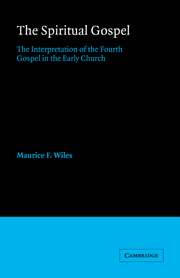Book contents
- Frontmatter
- Contents
- ACKNOWLEDGEMENTS
- ABBREVIATIONS
- INTRODUCTION Commentaries and commentators
- I The authorship and purpose of the Gospel
- II The Fourth Gospel and the Synoptic Gospels
- III Historicity and symbolism
- IV The signs
- V Leading ideas of the Gospel
- VI The Fourth Gospel and the Gnostics
- VII Christological interpretation in the third and fourth centuries
- VIII The Christological exegesis of Theodore and Cyril
- IX The Gospel of salvation
- EPILOGUE An assessment
- BIBLIOGRAPHY
- INDEX OF PROPER NAMES
- INDEX OF TEXTS
V - Leading ideas of the Gospel
Published online by Cambridge University Press: 06 March 2010
- Frontmatter
- Contents
- ACKNOWLEDGEMENTS
- ABBREVIATIONS
- INTRODUCTION Commentaries and commentators
- I The authorship and purpose of the Gospel
- II The Fourth Gospel and the Synoptic Gospels
- III Historicity and symbolism
- IV The signs
- V Leading ideas of the Gospel
- VI The Fourth Gospel and the Gnostics
- VII Christological interpretation in the third and fourth centuries
- VIII The Christological exegesis of Theodore and Cyril
- IX The Gospel of salvation
- EPILOGUE An assessment
- BIBLIOGRAPHY
- INDEX OF PROPER NAMES
- INDEX OF TEXTS
Summary
Professor Dodd devotes the whole of the second part of his Interpretation of the Fourth Gospel to a study of the leading religious concepts in the Gospel, in the attempt to define as closely as possible the dominant ideas with which the Evangelist operates. No such systematic treatment of these leading ideas is to be found in the general run of patristic commentaries. As with many modern commentaries, it is normally the introductory concept of the Logos which captures the attention and alone receives any thorough discussion or treatment. The one notable exception is the commentary of Origen. Origen objects that too many would-be exponents of the Christian faith concentrate their whole attention upon the idea of Christ as the Logos to the virtual exclusion of the many other titles ascribed to him. Yet these other titles are essential to a proper understanding of the significance of the title Logos. He also insists that the title Logos must always be considered, not as an isolated phrase, but in the light of the specific assertions of the immediate Johannine context. As a corrective therefore to this common but misleading approach, Origen deals in his very first book with many of the most important Christological titles used in the Gospel. He discusses the ideas of Christ as light, as resurrection, as the way, the truth, and the life, as Christ and king, as teacher and Lord, as Son, and as true vine and living bread. The titles of door and good shepherd are also mentioned but not interpreted.
- Type
- Chapter
- Information
- The Spiritual GospelThe Interpretation of the Fourth Gospel in the Early Church, pp. 65 - 95Publisher: Cambridge University PressPrint publication year: 1960



